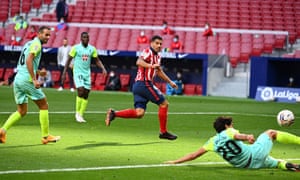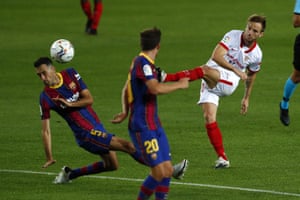By the time the transfer window closed, Barcelona had seen Luis Suárez go to Atlético Madrid, Ivan Rakitic to Sevilla, Arturo Vidal to Internazionale, Rafinha to Paris Saint-Germain and Jean-Clair Todibo to Benfica in return for a grand total of €3.5m – and that is the players they managed to get rid of. A couple of hours earlier, the club had been trying to force Ousmane Dembélé to go to Manchester United. He had cost €105m plus a further €45m in variables three years ago; now they hoped to raise €0, but did not manage that either.
Left without the money to make them happen, nor did they succeed in signing Memphis Depay and Eric García. The lights were still on at the Camp Nou offices well after midnight on the frantic final day of transfer business, but it wasn’t because they were closing the deals their coach, Ronald Koeman, requested, his revolution gathering pace. Instead it painted another portrait of their crisis, Barcelona were stuck, another failure consummated. Koeman admitted this was not the squad he planned for but it is the one he will have to work with.
Late last week Barcelona unveiled Sergiño Dest, yet he would prove to be the last signing, not joined by the striker and defender they need. “We want Depay to come to Barcelona and he wants to come,” Koeman told Dutch TV at the start of deadline day but by the end of it the forward was still in Amsterdam. García, meanwhile, was left at Manchester City for another year. Koeman always knew that was a possibility, saying: “We have to sell before Depay comes. The financial situation is very difficult.”
At €25m, Depay was already a climb down, albeit one to the manager’s taste: all year the talk had been of Lautaro Martínez, a €116m target from Inter. Reality had finally intervened, its logic as simple as it was inescapable: Barcelona do not have the money.
The club director Jordi Moix announced that with income €204m down on the projected figures, Barcelona had made an after-tax loss of €97m over the past year, despite saving €79m through cost-cutting following the restart, and that the outlook for this year is even bleaker.
Players will be asked to take another salary reduction. Yet Covid only explains part of it: even without the health crisis, Barcelona had one of their own and it was huge. They were barely projected to make a profit at all pre-pandemic – despite foreseeing an income of more than €1bn.
In 2017 Barcelona sold Neymar, not only a player but their succession plan, and the €222m they received for him from PSG was gone within six months. They tried desperately to replace him, to the extent that they ended up trying to get him back – but did not have the money to do so. Instead, they stumbled from one short-term solution to another, the long-term situation leaving them on edge until Covid came along and tipped them over it.
What was it Lionel Messi had said? Ah, yes: “For a long time now, there has been no project or anything. They go around juggling, trying to fill in the holes as they go along and things happen.” Since 2015 they had spent almost €1bn on players, none of whom have been an unqualified success, the greatest contribution to a wage bill that had become unsustainable. Meanwhile, those who had performed, those who had won, had grown older and better paid. In total, Moix said, Barcelona’s debt is just short of €500m.
Faced by the prospect of being personally liable, the board reacted. Or tried to. At the same time as it decided it was time to lead a revolution.

Beyond Dest, who started his Barcelona career out of position, this market has produced other arrivals and money spent on signings, largely on deals already set up or driven by finance as much as football. Pedri came from Las Palmas for €5m in an agreement signed off 12 months ago. Twenty-year old Francisco Trincão joined for €31m after 48 senior games at Braga – a signing sealed in January. And they paid €7m plus €3m in variables for Matheus Fernandes, who they had signed from Palmeiras in January too and was immediately loaned to Valladolid, where he played three games.
Then there was the deal agreed with Juventus for Miralem Pjanic, with Arthur Melo going in the other direction at the end of June, just before the close of the financial year. Officially, Pjanic cost €60m and Melo €72m. In reality, this was a deal rooted in accountancy more creative than either player. Another hole filled, for now. Bread for today, hunger tomorrow, as the Spanish phrase has it.
Quick guide
Barça begin process of reducing wages
Barcelona will reduce the pay of players, coaches and non-sporting staff to adapt to the huge losses suffered due to the Covid-19 pandemic, a club source said. Staff have been notified of the need to reduce costs after posting a loss of €97m in their annual financial report. All employees, including players, have been asked to nominate someone to represent them in negotiations over changes to their salaries, added the source. As well as money lost in ticket sales, the club is also missing income from merchandising, while stadium and museum tours have been badly affected by a huge drop in tourism. Barça's accounts make for grim reading, showing a 14% drop in revenue and the doubling of net debt to €488m.
Barça's financial troubles also led them to spend the close season lightening the biggest wage bill in European football, offloading Luis Suárez, Ivan Rakitic and Arturo Vidal for next to nothing, while selling Arthur Melo for €72m and Nelson Semedo for €30m. They only brought in three players, Miralem Pjanic, Francisco Trincao and Sergiño Dest for a combined €112m.
Reuters
Marc Cucurella also officially departed, his €10m move to Getafe finalised a year after actually going. But the only significant sale in terms of generating revenue was Nélson Semedo for €30m to Wolves. Sevilla got Rakitic for €1.5m with a potential €6m in variables. Vidal cost nothing up front and €1m in variables. Arda Turan was finally released three years after he last actually played for Barcelona. They paid for Suárez to go. Having told him to leave, they handed over half of the €14m salary – an agreement they momentarily reneged on when they realised Atlético was his destination.

Suárez, Rakitic, Vidal, and Rafinha: almost half a team for €1.5m. “Barcelona have given [them] away to Champions League teams and for zero cost. It’s hard to believe,” one journalist here noted but there was a reason – unexpectedly and simply laid bare by Celta Vigo’s Iago Aspas. “You’re forgetting the more or less €70m in salaries and the difficulties clubs have with salary limits this season,” he replied on social media.
There was a saving but it was not enough. Public desperation is never a good bargaining position, while the biggest earners were in no hurry to head off. Jordi Alba, Sergio Busquets, Gerard Piqué: none had been declared untouchable, but none had buyers. Philippe Coutinho has been given another chance, at least in part because the offers were insufficient or nonexistent. Junior Firpo and Martin Braithwaite cost €18m each. Who would pay that now? Alena and Riqui Puig were told they wouldn’t play either, but decided to take that chance.
Options reduced, Barcelona were open to approach: Semedo had initially been included in the list of “untransferibles” until the only concrete offer changed that. Once Semedo had gone, Dest could come. But there were others they wanted and as the final day accelerated, as Depay and García watched time slip away, desperation deepened. Books had to be balanced, wages cut, money raised. Any money, anyhow. How tempting it must have been for Europe’s clubs to knock at Barcelona’s door with a knockdown bid for ... well, just about anyone really.
Everything must go; everything that could go anyway. Barcelona were left scrabbling around for a deal, any deal, accepting whatever they could get. They had originally demanded €18m for Rafinha. In the end, and it really was the end, his flight leaving Barcelona for Paris at 9pm, they were grateful to be able to let him go at all. He went for free, a maximum €3m in variables and a 35% share of any future fee. They had claimed to have a similar €18m fee lined up for Todibo to go to Fulham, but that didn’t happen either: instead, they got €2m from Benfica in return for him leaving on loan.
Dembélé, for whom Barcelona had hoped to close a loan deal with United once they had accepted that they were not going to raise a transfer fee, refused to depart. So did Samuel Umtiti. The club are furious with them apparently, a narrative of blame set to build – as if it is the players’ duty to step aside to facilitate signings that the men responsible could not. They didn’t want to go. Perhaps only one man really did, and they wouldn’t let him. His name is Lionel Messi.
from Football | The Guardian https://ift.tt/3lncmQR
via IFTTT

No Comment